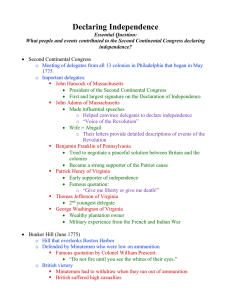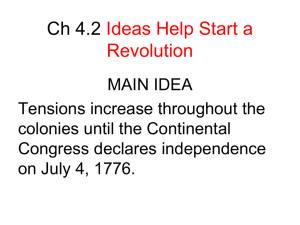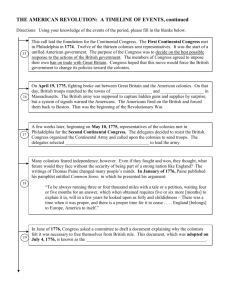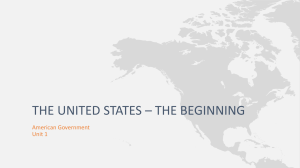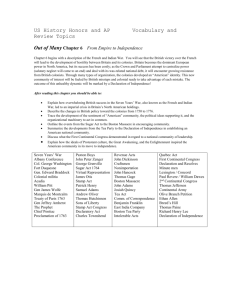Declaring Independence Essential Question: What people and events contributed to the
advertisement
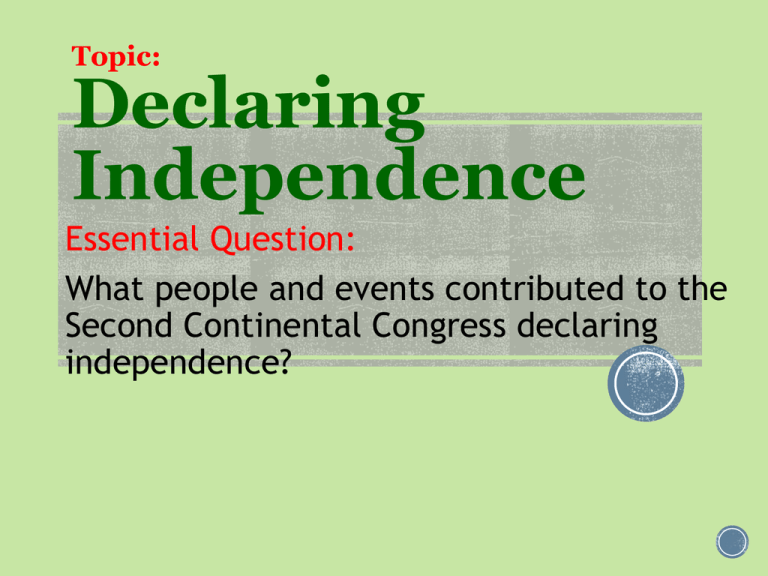
Topic: Declaring Independence Essential Question: What people and events contributed to the Second Continental Congress declaring independence? Second Continental Congress Meeting of delegates from all 13 colonies in Philadelphia that began in May 1775 Independence Hall Second Continental Congress Meeting of delegates from all 13 colonies in Philadelphia that began in May 1775 Important delegates: John Hancock of Massachusetts President of the Second Continental Congress First and largest signature on the Declaration of Independence President of the Second Continental Congress First and largest signature on the Declaration of Independence John Adams of Massachusetts Made influential speeches Helped convince delegates to declare independence “Voice of the Revolution” Helped convince delegates to declare independence “Voice of the Revolution” Wife = Abigail Their letters provide detailed descriptions of events of the Revolution 512 pages Wife = Abigail Their letters provide detailed descriptions of events of the Revolution Benjamin Franklin of Pennsylvania Tried to negotiate a peaceful solution between Britain and the colonies Became a strong supporter of the Patriot cause Tried to negotiate a peaceful solution between Britain and the colonies Became a strong supporter of the Patriot cause Discuss John Hancock, John Adams, Abigail Adams, and Benjamin Franklin Write a one-sentence description of one of the four Tried to negotiate a peaceful solution between Britain and the colonies Became a strong supporter of the Patriot cause Patrick Henry of Virginia Early supporter of independence Famous quotation: “Give me liberty or give me death!” Famous quotation: “Give me liberty or give me death!” Thomas Jefferson of Virginia 2nd youngest delegate Thomas Jefferson of Virginia 2nd youngest delegate George Washington of Virginia Wealthy plantation owner Military experience from the French and Indian War Wealthy plantation owner Military experience from the French and Indian War Discuss Patrick Henry, Thomas Jefferson, and George Washington If you could ask one of them a question, what would it be? How do you think he would answer? Wealthy plantation owner Military experience from the French and Indian War Bunker Hill (June 1775) Hill that overlooks Boston Harbor Defended by Minutemen who were low on ammunition Hill that overlooks Boston Harbor Defended by Minutemen who were low on ammunition Famous quotation by Colonel William Prescott: “Do not fire until you see the whites of their eyes.” Famous quotation by Colonel William Prescott: “Do not fire until you see the whites of their eyes.” British victory Minutemen had to withdraw when they ran out of ammunition British victory Minutemen had to withdraw when they ran out of ammunition British suffered high casualties Over 1000 = 1/3 of their forces in Boston Proved that the colonists could fight Death of General Warren Over 1000 = 1/3 of their forces in Boston Proved that the colonists could fight Continental Army Name of the American army during the Revolutionary War Continental Congress chose George Washington as commander Name of the American army during the Revolutionary War Continental Congress chose George Washington as commander Henry Knox Name of the American army during the Revolutionary War Continental Congress chose George Washington as commander Discuss Bunker Hill and the Continental Army Write a sentence explaining why Bunker Hill was important to the colonists. Name of the American army during the Revolutionary War Continental Congress chose George Washington as commander Olive Branch Petition (July 1775) Last attempt by the Second Continental Congress to reconcile with England and avoid full-scale war John Dickinson Olive Branch Petition (July 1775) Last attempt by the Second Continental Congress to reconcile with England and avoid full-scale war Rejected by the king Last attempt by the Second Continental Congress to reconcile with England and avoid full-scale war Rejected by the King Thomas Paine Moved to Philadelphia from England in 1774 Wrote Common Sense (1776) Moved to Philadelphia from England in 1774 Wrote Common Sense (1776) Influential pamphlet Encouraged the colonies to declare independence Written in simple language Statue in his hometown (Thetford, England) Encouraged the colonies to declare independence Written in simple language Discuss the Olive Branch Petition and Common Sense Choose one of the following: Explain the importance of the Olive Branch Petition Explain the importance of Common Sense Encouraged the colonies to declare independence Written in simple language Independence Committee of Five Appointed on June 11, 1776 Job was to draft a formal declaration of independence Appointed on June 11, 1776 Job was to draft a formal declaration of independence Members: Benjamin Franklin John Adams Robert Livingston Roger Sherman Thomas Jefferson Roger Sherman Thomas Jefferson Second Continental Congress voted to declare independence on July 2, 1776 Declaration of Independence Written by Thomas Jefferson “Pen of the Revolution” Written by Thomas Jefferson “Pen of the Revolution” Influenced by the ideas of John Locke “Pen of the Revolution” Influenced by the ideas of John Locke Approved on July 4, 1776 Influenced by the ideas of John Locke Approved on July 4, 1776 Began signing the Declaration on August 2, 1776 Approved on July 4, 1776 Began signing the Declaration on August 2, 1776 Discuss the Committee of Five and the Declaration of Independence Explain how John Locke’s ideas influenced the Declaration of Independence

